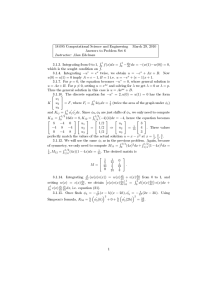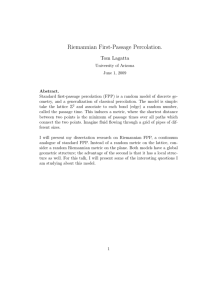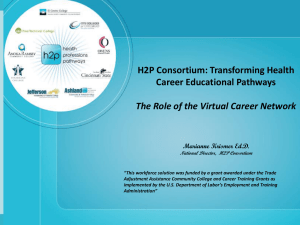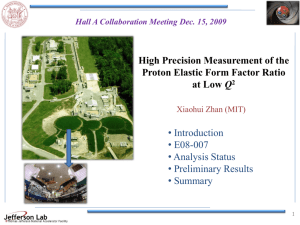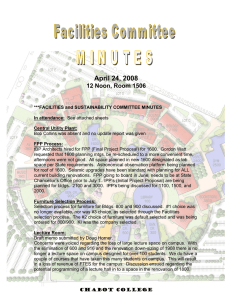Faculty Policies and Procedures (Post-Tenure Review policy)
advertisement
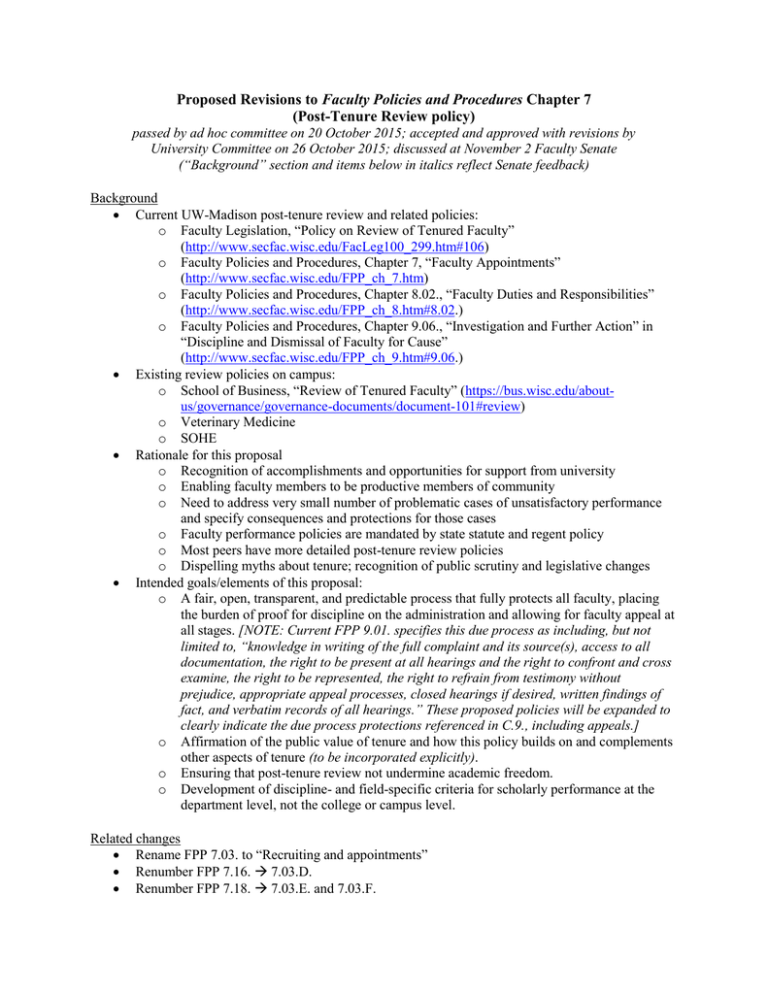
Proposed Revisions to Faculty Policies and Procedures Chapter 7 (Post-Tenure Review policy) passed by ad hoc committee on 20 October 2015; accepted and approved with revisions by University Committee on 26 October 2015; discussed at November 2 Faculty Senate (“Background” section and items below in italics reflect Senate feedback) Background Current UW-Madison post-tenure review and related policies: o Faculty Legislation, “Policy on Review of Tenured Faculty” (http://www.secfac.wisc.edu/FacLeg100_299.htm#106) o Faculty Policies and Procedures, Chapter 7, “Faculty Appointments” (http://www.secfac.wisc.edu/FPP_ch_7.htm) o Faculty Policies and Procedures, Chapter 8.02., “Faculty Duties and Responsibilities” (http://www.secfac.wisc.edu/FPP_ch_8.htm#8.02.) o Faculty Policies and Procedures, Chapter 9.06., “Investigation and Further Action” in “Discipline and Dismissal of Faculty for Cause” (http://www.secfac.wisc.edu/FPP_ch_9.htm#9.06.) Existing review policies on campus: o School of Business, “Review of Tenured Faculty” (https://bus.wisc.edu/aboutus/governance/governance-documents/document-101#review) o Veterinary Medicine o SOHE Rationale for this proposal o Recognition of accomplishments and opportunities for support from university o Enabling faculty members to be productive members of community o Need to address very small number of problematic cases of unsatisfactory performance and specify consequences and protections for those cases o Faculty performance policies are mandated by state statute and regent policy o Most peers have more detailed post-tenure review policies o Dispelling myths about tenure; recognition of public scrutiny and legislative changes Intended goals/elements of this proposal: o A fair, open, transparent, and predictable process that fully protects all faculty, placing the burden of proof for discipline on the administration and allowing for faculty appeal at all stages. [NOTE: Current FPP 9.01. specifies this due process as including, but not limited to, “knowledge in writing of the full complaint and its source(s), access to all documentation, the right to be present at all hearings and the right to confront and cross examine, the right to be represented, the right to refrain from testimony without prejudice, appropriate appeal processes, closed hearings if desired, written findings of fact, and verbatim records of all hearings.” These proposed policies will be expanded to clearly indicate the due process protections referenced in C.9., including appeals.] o Affirmation of the public value of tenure and how this policy builds on and complements other aspects of tenure (to be incorporated explicitly). o Ensuring that post-tenure review not undermine academic freedom. o Development of discipline- and field-specific criteria for scholarly performance at the department level, not the college or campus level. Related changes Rename FPP 7.03. to “Recruiting and appointments” Renumber FPP 7.16. 7.03.D. Renumber FPP 7.18. 7.03.E. and 7.03.F. 7.17. Create new 7.17. (below, drawing from II-106) Once new FPP 7.17. is passed by Senate, a “jump start” Senate mandate will be required: “Each departmental executive committee shall establish written criteria and procedures governing the periodic review of each tenured faculty member consistent with FPP 7.1.7., to be submitted to the relevant dean’s office, the provost, and the secretary of the faculty by [April 30, 2015].” Rescind II-106. Revise FPP 5.21.D.1. to: “The departmental executive committee shall provide for the periodic review of the performance of every faculty member as indicated in 7.17. of these rules.” REVIEW OF TENURED FACULTY A. PURPOSE The purposes of the review of tenured faculty are: a. to recognize outstanding achievement; b. to provide opportunities for mentoring and professional development; c. to help identify and remedy, from a developmental point of view, any deficiencies. The process of post-tenure review is the periodic assessment of each faculty member's activities and performance, in accordance with the mission of the department, college, and institution, and the responsibilities of the faculty as described in FPP 8.02., in such a way as to determine that the faculty member is meeting his or her obligations to the university and the State of Wisconsin. The review is to be appropriately linked to the merit process, and "should not involve the creation of unnecessary additional bureaucracy." B. CRITERIA 1. The criteria for review should reflect the overall mission of the department and should, be sufficiently flexible to accommodate faculty with differing responsibilities, and recognize that careers and levels of productivity may change over time. In developing such criteria, departments may draw on statements used in their current faculty review procedures, such as merit or promotion review. 2. Each department shall develop criteria to measure progress in scholarly productivity as appropriate to the field. 3. The executive committee of each department shall ensure that the criteria governing faculty review do not infringe on the accepted standards of academic freedom of faculty, including the freedom to pursue novel, unpopular, or unfashionable lines of inquiry, and recognize that scholarly projects take varying amounts of time to come to fruition. Nothing in the criteria or application of these policies shall allow the review to be prejudiced by factors proscribed by applicable state or federal law, such as race, religion, sex, sexual orientation, ethnicity, age, and handicap. C. PROCEDURES 1. Reviews shall occur at least once every five years. These reviews may be incorporated into the annual merit review process or combined with promotion, retention, salary, or other reviews, including but not limited to nominations for chaired professorships, major teaching awards, and national professional honors or awards. In the case of combined reviews, the department may require supplementary documentation from the faculty member, which meets the criteria below, that would not otherwise be required for the other review. 2. Each review, as determined by each department's executive committee, shall be carried out by two or more tenured faculty members, who may be drawn from outside the department. If the faculty member under review formally objects to a reviewer, the chair, in consultation with the relevant dean, shall identify other appropriate reviewers. Such formal objections should be kept confidential. In the case of a faculty member with appointments in more than one department, the department chairs of the affected departments shall agree on procedures for the conduct of the review. 3. Review procedures shall include a. A review of qualitative and quantitative evidence of the faculty member's performance over at least the previous five-year period. The evidence should include a current curriculum vitae, annual activity reports, teaching evaluations or summaries of evaluations, and other materials providing evidence of the faculty member's accomplishments and contributions that the department or the faculty member feel are relevant to the review. The faculty member should provide the reviewers with a brief summary of career plans for the future. Letters from outside the university would not ordinarily be a part of the review process. The faculty member under review, however, may submit appropriate letters if she or he so chooses. The reviewers shall examine materials to the degree needed to accomplish the purposes of this review, which are to assess whether the faculty member is satisfactorily performing his or her duties to the university and the State of Wisconsin, and to encourage the improvement of faculty skills. b. Discussion with the faculty member about his or her contributions to the profession, the department, and the university if either the reviewers or the faculty member so desire. c. Appropriate consideration of a faculty member's contributions outside the department to interdisciplinary and other programs, governance, and administration. d. Other steps the reviewers consider useful in making a fair and informed judgment, including but not limited to consultation with individuals who have knowledge of the faculty member's work. e. Determination of an overall ranking of “satisfactory” or “unsatisfactory” performance. An “unsatisfactory” ranking indicates that a faculty member has failed to meet basic expectations of the position as described in FPP 8.02. and as specified by criteria set forward by the department in 7.17.B. Departments may develop other ranking levels, provided that there is a distinction between satisfactory and unsatisfactory performance. 4. The reviewers shall provide the faculty member with a ranking of satisfactory or unsatisfactory performance and a written summary of the review by the end of the academic year. The faculty member shall have the opportunity to prepare a written response to the summary within 30 days after receipt of the summary and ranking. 5. A copy of the summary and any written response to it shall be given to the department chair and shall be placed in the personnel file of the faculty member. The department shall also preserve in the faculty member's personnel file all documents that played a substantive role in the review (other than documents such as publications that are readily accessible elsewhere), and a record of any action taken as a result of the review. 6. Faculty identified as exceptional should be considered for nomination for university, national, and international recognition. 7. In the event of an unsatisfactory ranking, the department chair and the faculty member shall develop a written plan to address all issues identified in the review with the faculty member and in consultation with the appropriate dean(s). Such a plan could include review and adjustment of the faculty member’s responsibilities, development of a new research program or teaching strategy, referral to campus resources, assignment of a mentoring committee, institution of mandatory annual reviews for a specified period, written performance expectations, and/or other elements. 8. Following an unsatisfactory ranking, the department shall conduct a review in the following year. 9. In the event of three unsatisfactory rankings, the dean shall refer the faculty member to the provost for review of performance of responsibilities defined in FPP 8.02. and possible further action under the process described in FPP 9.06. The faculty member retains all protections guaranteed in FPP, including the right to appeal all reviews per FPP 9.01. [NOTE: Faculty members are already subject to discipline or dismissal based on this standard. Specifically, FPP 9.02. defines just cause for discipline as “a determination that the faculty member has violated a university rule or policy or has engaged in conduct which adversely affects the faculty member’s performance of his/her responsibilities to the university” and FPP 9.03. defines just cause for dismissal as “a determination that the faculty member’s conduct directly and substantially affects adversely, to a degree greater than that reserved for disciplinary action, the ability to carry out satisfactorily his/her responsibilities to the university.” The proposed process makes clear that there are opportunities for faculty members to address concerns before a formal process is implemented, while explicitly pointing to FPP 8.02., which defines faculty duties and responsibilities, as a “university rule or policy” under FPP Ch. 9.] D. ACCOUNTABILITY 1. Copies of the departmental criteria and procedures for reviews of tenured faculty shall be filed with the appropriate dean, the provost, and the secretary of the faculty. 2. At the beginning of each academic year, the chair shall identify faculty to be reviewed by the end of that year and the executive committee shall establish a calendar for reviews. 3. Departments shall maintain a record of reviews completed, including the names of all reviewers. 4. At the end of each academic year, department chairs shall send a report to the appropriate dean(s) listing the names of faculty members reviewed during that academic year and summarizing the outcomes of those reviews. For reviews resulting in unsatisfactory rankings, the appropriate dean will be notified per section 7.17.C.7. above. 5. If a department fails to conduct requisite reviews by the end of the academic year, the dean shall appoint reviewers to conduct reviews based on the department’s specified criteria. 6. The periodic review of each department, in which the department's mission, personnel, and development are now evaluated, shall include review of the process for review of tenured faculty in the department.
